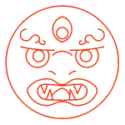Esoteric Visions of the Past: East Asia and Beyond
Abstract
The East Asian Network for the Academic Study of Esotericism (EANASE) invites scholars to submit proposals for its 2nd online conference, focusing on the theme “Esoteric Visions of the Past: East Asia and Beyond.”
This conference aims to explore how the region once referred to as the “Far East” has influenced and shaped various esoteric and spiritual visions of history, and conversely, how fantastical views of the past were developed within and impacted different areas of East Asia.
We understand that East Asia is not a monolithic or readily-identifiable entity, but rather a historical construction that has been constantly reshaped and re-invoked for multiple reasons and by a number of actors, many of whom have come from outside the political frontiers of China, Japan and Korea.
Moreover, whereas an ‘East Asian-centred’ approach might be initially helpful to counterbalance ‘Euro-american-centred’ perspectives still prevalent in academic settings, East Asia – however defined – has flourished in a changing, closely interconnected world.
Topics
We invite papers on different disciplinary and methodological perspectives which speak in some way to the conference theme.
While papers can be focused on any particular region of the globe, it is important to think beyond the constraints of national borders. Papers must thus demonstrate trans-national/local/cultural connections within or beyond the East Asian cultural sphere (broadly defined; we imagine, for example, that some papers may consider Southeast Asian locales too).
Potential themes and sub-themes could include but are not limited to:
- The East Asian past in spiritualism, mesmerism, occultism and esoteric new religious movements such as New Thought, Theosophy, New Science etc.
- Uses of the past in the construction of “Eastern” martial arts and self-cultivation methods, such as mindfulness etc.
- Appropriation and reinterpretation of East Asian pasts within political movements from the entire spectrum of ideologies, from the far left to the far right and beyond.
- Views of East Asian history in the construction of alternative medicines and therapeutic techniques.
- Views of East Asia in futurological accounts or as providing alternative models of historical development and modern lifestyles with an emphasis on its alleged “esoteric,” “mystical” or “traditional” features.
- Analyses of “East Asia” in pseudoarchaeology, ancient aliens and associated interests.Analyses of “East Asia” in pseudoarchaeology, ancient aliens and associated interests.
Participants
Proposals from researchers from anywhere in the world and at all stages of their careers are welcomed.
The conference aims to be as interdisciplinary and diverse as possible, and thus scholars from all disciplines and backgrounds are welcome.
Submissions from graduate students and early career researchers are especially encouraged.
Language and recording
The conference language is English.
Presentations will be held on Zoom and open to the public.
The Conference will be hybrid, with most presentations held online, and a smaller section to be held on-site at Tohoku University, in Sendai (Japan)
Submissions
Please submit your paper proposal, including a title, abstract (300 words maximum), and a brief biography (150 words maximum), to eanase.office@gmail.com by September 20, 2024. In your proposal, please also specify whether you would like to participate online or on-site.
Decisions will be announced by 30 September 2021.
Conference Dates
November 30 (Saturday) – December 1 (Sunday), 2024.
We will do our best to accommodate presenters from all time zones. We will inquire about the availability of selected presenters before announcing the schedule.
We will also try to avoid all-male panels and will consider all proposals based not only on the range of topics and approaches but also on the speakers’ backgrounds, in order to attain a diverse conference welcoming to everyone.
Abstracts that we cannot accommodate at this conference may be invited to present in a podcast/interview.
Organisers (in alphabetic order)
Cui Yuna (M.A. student, Tohoku University, Japan)
Ioannis Gaitanidis (Associate Professor, Chiba University, Japan)
Han Sang-yun (PhD candidate, Tohoku University, Japan)
Kennosuke Motegi (Associate Professor, Tohoku University, Japan)
Luis Fernando Bernardi Junqueira (Research Associate, University of Strathclyde, Scotland)
Orion Klautau (Associate Professor, Tohoku University, Japan)
Avery Morrow (PhD candidate, Brown University, US)
Institutional Support
Centre for the Social History of Health and Healthcare, University of Strathclyde
Graduate School of International Cultural Studies, Tohoku University, Japan
Graduate School of Global and Transdisciplinary Studies, Chiba University, Japan
Department of Religious Studies, Brown University, USA
